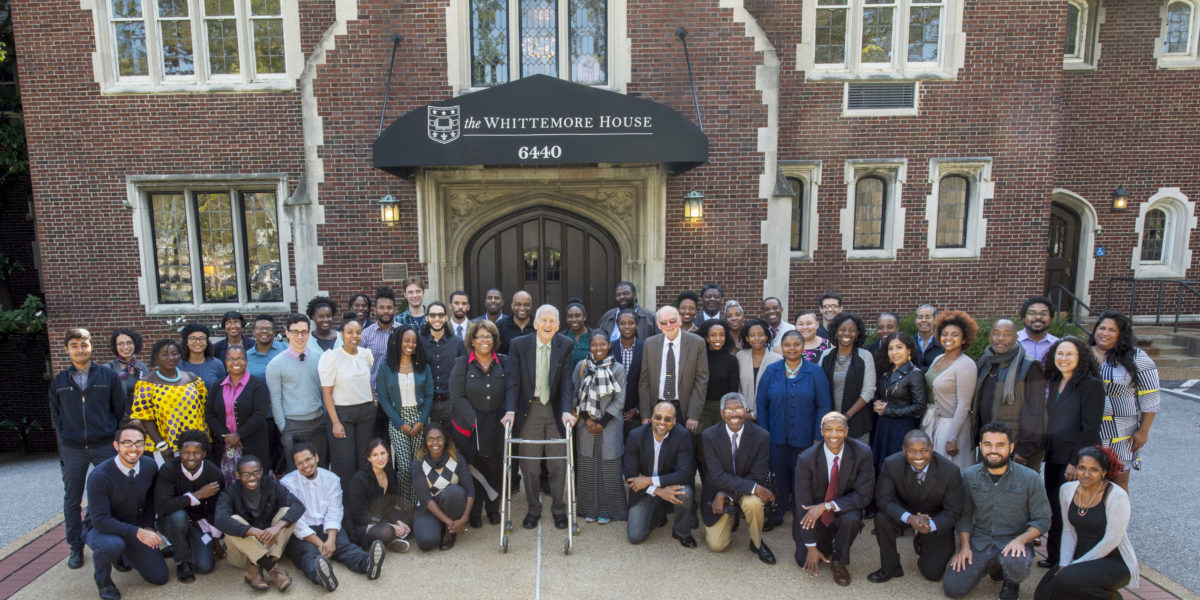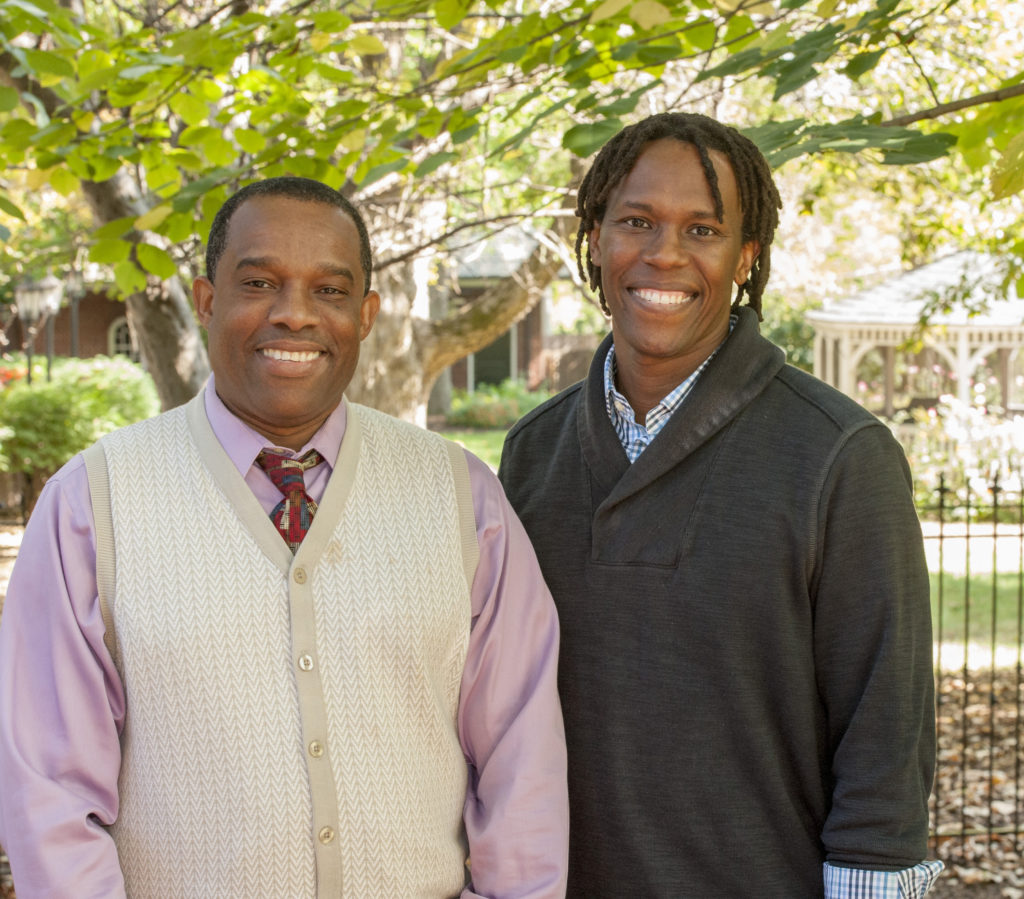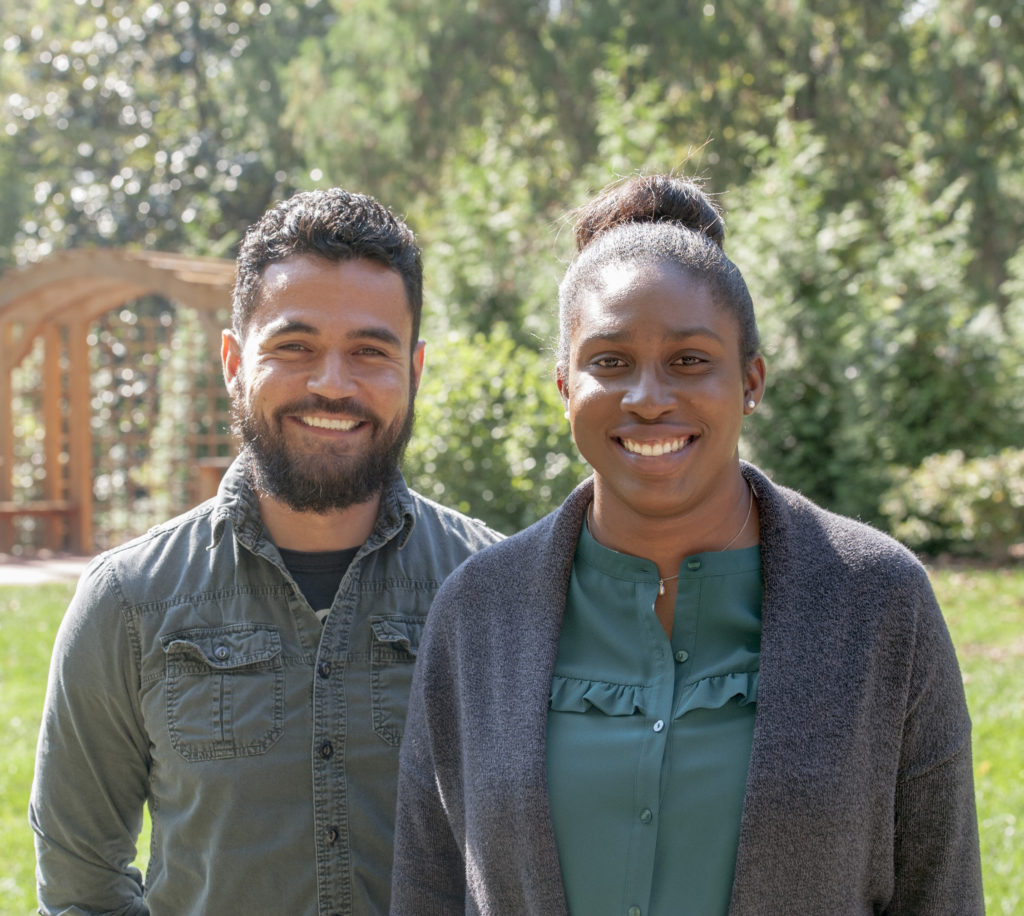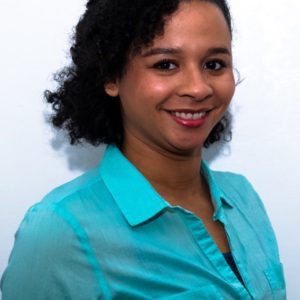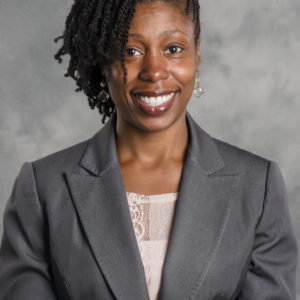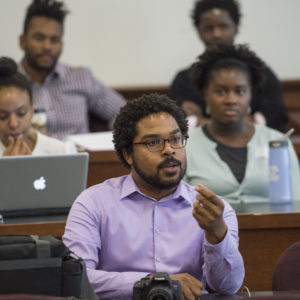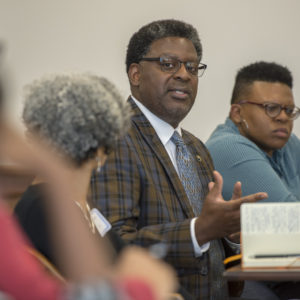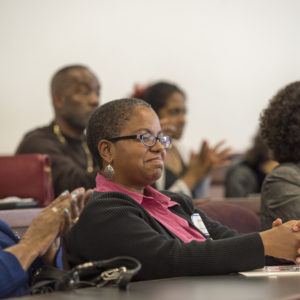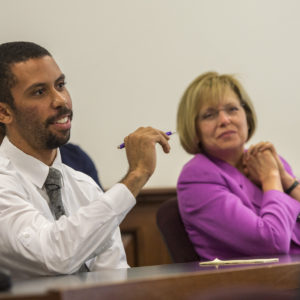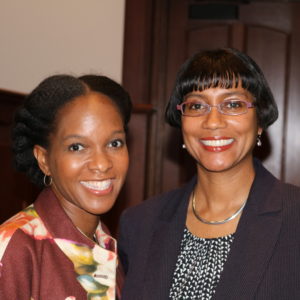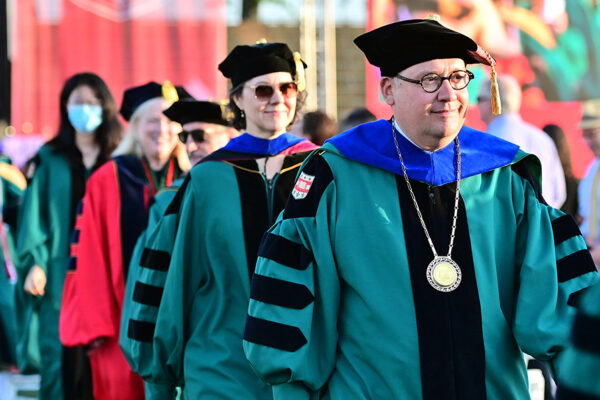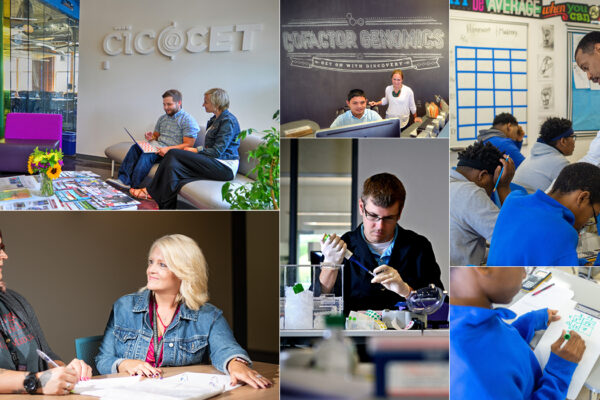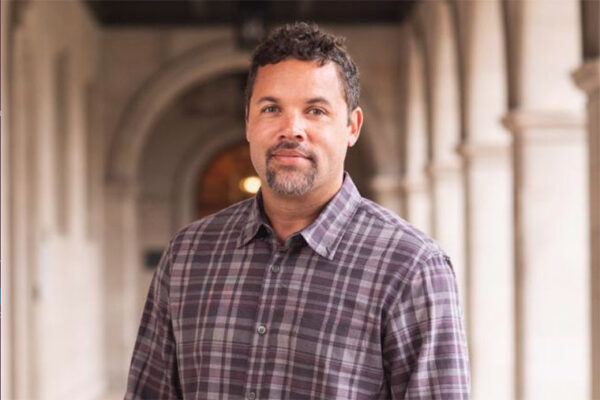In fall 1991, Roland “Randy” Glean, PhD ’97, entered Washington University as a graduate student in political science. He had heard about and applied for a new initiative, the Chancellor’s Graduate Fellowship Program, founded to bring African-American students interested in becoming college professors to the university for graduate study. The ultimate goal was to diversify the professoriate, which was then only 4.2 to 4.9 percent of faculty members at U.S. universities and colleges, in a broad sense.
Glean remembers that he was already on campus when he received an invitation to interview for the fellowship with Gerald Early, now the Merle Kling Professor of Modern Letters and a mainstay of the program for 25 years. A few days later, Glean learned he had indeed been selected for the fellowship. “So that kind of made my day,” he says.
Glean became a member of the first cohort of five Chancellor’s Fellows. He calls the impact “life-changing, life-defining.” He says, “The program was excellent. It taught me everything that would guide my career going forward. I don’t think I would have been as good a person or a professional had I not been a Chancellor’s Fellow. It meant that much.”
One life-changing opportunity was when Glean volunteered to assist Joyce Edwards, assistant dean and inaugural director of the fellowship program who served from 1991 to 2001, with her recruiting travels. In this position, he essentially helped recruit a few of the other early fellows to the program. And that experience had such an impact on his career that he moved from becoming a professor in political science to becoming the director of the international program at Midwestern State University. Today, he is building a stellar program, recruiting international students from more than 50 countries to MSU and also recommending numerous MSU students for the Chancellor’s Graduate Fellowship Program. Indeed, 12 have earned doctoral degrees from Washington University.
One such fellow is Chanez Symister, a doctoral student in chemistry. Glean recruited Symister to Midwestern State in Wichita Falls, Texas, from her home on Antigua and Barbuda, a two-island country in the Caribbean. When she graduated, she recalls that Glean asked her, “What are you doing?” She told him that she hadn’t started her job search yet and was taking a post-graduation break.
She remembers Glean saying, “Nope, nope, nope. Come to my office; let’s discuss graduate school.” At his office, Symister says, “He actually picked up the phone, dialed the number for WashU chemistry, gave me the phone and just put me on the spot.” Even though it was a bit late in the application process, the department allowed her to apply, and she was admitted to it and to the Chancellor’s Graduate Fellowship Program (CGFP).
What would she tell potential applicants about the program? “Of course, apply! It’s a way to gain a group of people who will support you, regardless of your field. You always have a home; you always have a family. After you graduate from WashU, you will always have a perpetual support system.”
For Pablo Zavala, a fourth-year doctoral student in Hispanic languages and literatures, he decided to pursue a doctorate and become a college faculty member when he was a community college student. “I like teaching a lot,” he says. “It’s the dynamics of being in the classroom and talking with students, helping the discussion move along and getting feedback from members of the class. That’s something I really want to do.
Being a Chancellor’s Fellow has helped Pablo Zavala “find my place both personally and professionally because of the connections that I’ve been able to establish with my colleagues.”
“And research, it’s a little bit more challenging because it’s a lot of hours by yourself, but I love research as well,” he says.
Zavala values the stipend the Chancellor’s Graduate Fellowship Program provides. “It really does help a lot, because you don’t have to worry about trying to find funding for research,” he says. “So I feel blessed in that sense.”
Being a Chancellor’s Fellow, he says, has helped him “find my place both personally and professionally because of the connections that I’ve been able to establish with my colleagues.”
Juliette Iacovino, a doctoral student in psychological and brain sciences, was drawn to the CGFP because of the opportunities for funding and networking and community. She says being a fellow helped immensely with her transition into graduate school.
And the professional development opportunities have been paramount. She recalls the time that Rafia Zafar, professor of English, African and African-American studies and American culture studies, as well as director of the CGFP from 2011 to 2014, brought Washington University alumnus Sherman James, PhD ’73 (psychology), to campus. “He’s a well-known scholar in racial health disparities, and that’s what I study,” Iacovino says. “He came and spoke to us about his career trajectory. So I got to meet him, and he’s actually one of my mentors now.”
Iacovino also counts as her mentors Zafar and Sheri Notaro, current director of the program and associate dean of the Graduate School. “I’ve been able to benefit from their guidance,” Iacovino says. “You don’t necessarily think that a director of a fellowship program will become a mentor, but I was lucky — and a lot of other people have been lucky — to form a relationship with them as well.”
Recently, Iacovino says, she wrote a chapter with James about psychosocial barriers people of color face in higher education. She also has served on two different panels for the annual Chancellor’s Fellowship Conference, which brings in outside speakers. She says this allowed her to “form relationships with very well-known, accomplished scholars of color. It’s amazing to benefit from that, be part of that, and be exposed to these different people, all just staying on the Washington University campus.”
Lisa Cothran, MA ’02, PhD ’05 (psychology), sounds a common theme of fellows past and present when she says that the financial support was important, but the program provided “a place where I could readily interact with people from other disciplines and exchange ideas and experiences, common and different. It really helped enrich my experience while I was at WashU.”
Cothran, associate professor of psychology at Alabama State University, says being a college professor has exceeded her expectations. “I like the changing nature of it,” she says. “I also like being a supporter but also an encourager of people to move beyond their current status and really go after new knowledge and scholarship.” Cothran also likes being around young people who are not afraid to go for their dreams.
Gerald “Gerry” Downes, PhD ’99 (neurosciences), says the Chancellor’s Fellowship played an important role in bringing him to Washington University for graduate study. While considering his options, “one thing that distinguished WashU was the Chancellor’s Fellowship. This opportunity to have students of color come together mixed with the fellowship support was a very attractive combination and something I wanted to be part of,” he says.
An associate professor of biology at the University of Massachusetts-Amherst, Downes was one of the CGFP alumni who came back recently to Washington University to celebrate the program’s 25th anniversary, Oct. 13–15, 2016, and to present his research at the medical school. Downes is also one of the first recipients of funds from the newly created Chancellor’s Graduate Fellows Alumni Initiative, a partnership between the Office of the Vice Provost for Faculty Advancement and Institutional Diversity and the Chancellor’s Graduate Fellowship Program.
Celebrating 25 years
Chancellor Mark S. Wrighton calls the Chancellor’s Graduate Fellowship Program “one of the great legacies of my predecessor, Dr. William Danforth.” Wrighton says the program is “a great opportunity for Washington University to be a leader” in developing diversity among university faculty.
Today, the program has 45 current fellows and 120 alumni, with about half having careers in academia. Since its inception in 1991, criteria for those admitted to the program have broadened to include “diversity” in a variety of forms, including students from lower socioeconomic backgrounds and those who are the first in their family to go to college.
What the program is looking for in candidates, Notaro says, is academic excellence, community service and a plan for a career in the professoriate. Those admitted, she says, should be the “very best students, with a passion for their work, and who will also make an impact while they are here.”
Those “very best students” — both current fellows and CGFP alumni — gathered at the university Oct. 13–15, 2016, for the program’s annual conference and a reunion to celebrate the program’s 25th anniversary. As with each conference, the CGFP invited a distinguished scholar to deliver a keynote address. This year, Imani Perry, the Hughes-Rogers Professor of African American Studies at Princeton University, spoke about “Looking for Lorraine: Gifts of the Hidden Hansberry.” Foreshadowing her forthcoming biography of the playwright and writer, Perry explored Hansberry as a critical figure for conceptualizing race, gender, sexual orientation and global politics.
Following the luncheon, a faculty panel discussed issues raised in Perry’s address. In addition to Perry, the panel included two Washington University professors — Adrienne Davis, vice provost and the William Van Cleve Professor of Law; and Rafia Zafar, professor of English — and two alumni of the CGFP — Keona Ervin, MA ’95, PhD ’09 (history), assistant professor of history at the University of Missouri–Columbia; and Bertin Louis Jr., MA ’03, PhD ’08 (anthropology), assistant professor of anthropology at the University of Tennessee–Knoxville.
At the evening’s gala dinner for alumni, current fellows and invited guests, Randy Glean, alumnus chair of the 25th anniversary reunion celebration, accepted the inaugural Chancellor’s Graduate Fellowship Program Alumni Partnership Award. A video produced for the occasion by Arts & Sciences Communications made its debut and can be seen below.
On the second day, program alumni held professional development workshops for current fellows. Topics included careers in higher education administration, entrepreneurship, navigating the academic job market, preparing for tenure, planning for promotion to full professor, the publishing process, mentoring and networking.
As she looks to the future, Notaro says, “Over the next 25 years, our goal is to realize the full potential of the fellowship to diversify the faculty at Washington University.”
Downes agrees with the objective: “The ultimate success of the program would be to have Chancellor’s Fellows come back and actually join the faculty at WashU,” he says. “I think that would be rewarding to see the vision carried out, that would be the ultimate validation of the approach.”
